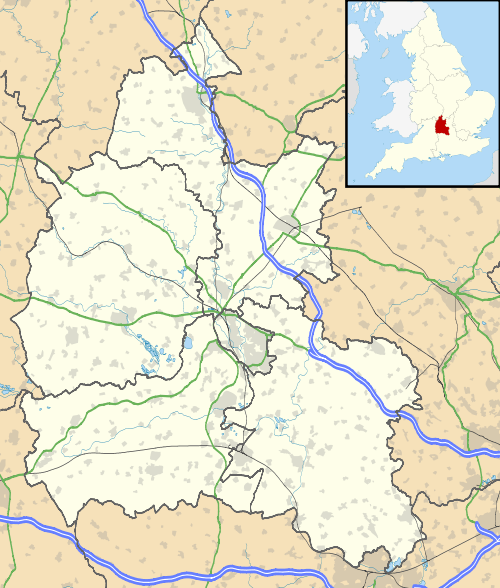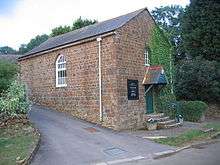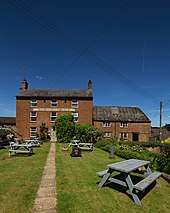Balscote
Balscote or Balscott is a village in the civil parish of Wroxton, Oxfordshire, about 4 miles (6.4 km) west of Banbury.
| Balscote | |
|---|---|
.jpg) Parish church of St Mary Magdalene | |
 Balscote Location within Oxfordshire | |
| OS grid reference | SP3941 |
| Civil parish | |
| District |
|
| Shire county | |
| Region | |
| Country | England |
| Sovereign state | United Kingdom |
| Post town | Banbury |
| Postcode district | OX15 |
| Dialling code | 01295 |
| Police | Thames Valley |
| Fire | Oxfordshire |
| Ambulance | South Central |
| UK Parliament | |
| Website | Wroxton & Balscote Community Web Site |
The Domesday Book of 1086 records the place-name as Berescote. Curia regis rolls from 1204 and 1208 record it as Belescot. An entry in the Book of Fees for 1242 records it as Balescot. Its origin is Old English, meaning the cottage, house or manor of a man called Bælli.[1]
Church and chapel
Church of England
The earliest features of the Church of England parish church of St Mary Magdalene include a Norman font and an Early English Gothic window. Most of the present church building is 14th-century, built in a Decorated Gothic style.[2] It is a Grade II* listed building.[3]
The parish of St Mary Magdalene is now one of eight in the Ironstone Benefice.[4]

Methodist chapel
Balscote has also a Methodist chapel.
Secular buildings
Many of Balscote's buildings are of local Hornton Stone. Priory Farm is a 14th-century hall, extended in the 15th century and modernised in the 17th and 18th centuries. Grange Farm is a 15th- or early 16th-century house, extended and modernised in the 17th and 18th centuries. Both houses may have been built by the owners of nearby Wroxton Abbey.[5]

Balscote has a public house, The Butchers Arms,[6] which is controlled by the Hook Norton Brewery.[7]
In 1996 Balscote Village Hall Trust, a registered charity, started planning and fund-raising to build a community hall.[8] Building began in October 2010[9] and was completed in 2011.[10] It is a timber building.[11]
Notable residents
- Nicholas de Balscote (died 1320), Chief Baron of the Irish Exchequer was born in Balscote.
- Alexander Petit (died 1400), one of the dominant figures in late 14th-century Ireland, was also a native of Balscote. He held many important offices including Bishop of Ossory, Bishop of Meath and Lord Chancellor of Ireland. As was usual at the time he was more commonly referred to, not by his family name, but his birthplace, as Alexander de Balscot.[12] He may have been a relative of Nicholas de Balscote, who is known to have appointed several family members to important positions in Ireland, or they may simply have shared a birthplace.
References
- Ekwall 1960, Balscott.
- Sherwood & Pevsner 1974, p. 428.
- Historic England. "Church of St Mary Magdalene (Grade II*) (1299831)". National Heritage List for England. Retrieved 24 June 2019.
- "Welcome to the eight Churches of the Ironstone Benefice in North Oxfordshire". The Ironstone Benefice. 24 June 2019.
- Sherwood & Pevsner 1974, pp. 428–429.
- Historic England. "The Butchers Arms Public House (Grade II) (1185111)". National Heritage List for England. Retrieved 24 June 2019.
- "Butchers Arms, Balscote". Hook Norton Brewery. Retrieved 24 June 2019.
- "Balscote Village website". Archived from the original on 25 January 2010. Retrieved 17 March 2009.
- "Long fight ends as work begins". Banbury Guardian. Johnston Press. 21 October 2010.
- "Balscote, Oxfordshire opens village hall". BBC News. 3 June 2011.
- "Balscote" (pdf). Timberworks Europe.
- O'Flanagan 1870
Bibliography
- Ekwall, Eilert (1960) [1936]. Concise Oxford Dictionary of English Place-Names (4th ed.). Oxford: Oxford University Press. Balscott. ISBN 0198691033.
- Lobel, Mary D; Crossley, Alan, eds. (1969). "Wroxton". A History of the County of Oxford. Victoria County History. 9: Bloxham Hundred. London: Oxford University Press for the Institute of Historical Research. pp. 171–188. ISBN 978-0-19722-726-8.CS1 maint: ref=harv (link)
- O'Flanagan, J Roderick (1870). Lives of the Lord Chancellors of Ireland. Dublin: Longmans Green.CS1 maint: ref=harv (link)
- Sherwood, Jennifer; Pevsner, Nikolaus (1974). Oxfordshire. The Buildings of England. Harmondsworth: Penguin Books. pp. 428–429. ISBN 0-14-071045-0.CS1 maint: ref=harv (link)
